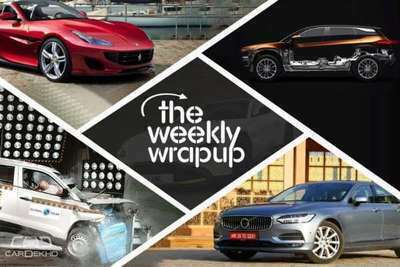Nutson's Weekly Automotive News Wrap-up September 29-October 5, 2024
 |
 |
LEARN MORE: Complete versions of today's news nuggets, along with hundreds of thousands of pages of relevant news, information and opinions, are stored in a million-page library published and indexed on The Auto Channel during the past 25 years. Complete information can be found by copying a headline and inserting it into any Site Search Box.
Here are Larry's top story picks from this past week's important to you, relevant, semi-secret, or snappy automotive news, opinions and insider back stories presented as expertly crafted easy-to-understand automotive news nuggets.
Nutson's Auto News Wrap-up Week Of September 29 - October 5, 2024
- Auto sales on idle. Prices are high as are borrowing costs. Third quarter sales slipped at most all automakers. Interestingly, sales of BEVs and PHEVs buoyed things up a bit. Sales of more-affordable smaller cars and SUVs are up while midsize cars, trucks, and larger SUVs have declined. Leasing is becoming more popular with the Q3 penetration at 25% of new car sales. Analysts anticipate volatility the rest of the year as affordability remains a challenge and the U.S. presidential election looms.
- Let the Feds do it. In California, Gov. Gavin Newsom vetoed a bill that would have required new cars to beep at drivers if they exceed the speed limit. California would have become the first to require such systems--Intelligent Speed Assist, for all new cars, trucks and buses sold in the state starting in 2030. The bill, aimed at reducing traffic deaths, would have mandated that vehicles beep at drivers when they exceed the speed limit by at least 10 mph. In explaining his veto, Newsom said federal law already dictates vehicle safety standards and adding California-specific requirements would create a patchwork of regulations. The legislation would have likely impacted all new car sales in the U.S., since the California market is so large that car manufacturers would likely just make all of heir vehicles comply. Full story HERE
- Keep on truckin'. The Carfax Used Car Index reports most used-car segments prices are going up. But, one category is still dropping: used Pickup Trucks. Their average price on Carfax.com is down about $2,700 from a year ago, and $700 down just since June! Luxury SUVs are also dropping month-over-month. Get the details HERE
- Bigger is better, for some. According to a new AutoPacific study, big infotainment screens and functionality appeal to young families and those who use their vehicle for work. Results reveal relatively modest overall demand (13%-18% depending on the screen type or functionality) with greatest interest coming from those intending to purchase a 2 or 3-row large SUV, sports car or large car. Get the details HERE
- Buy a Ford EV and get a free EV charger. Ford Motor Company will give any Ford EV buyer a free home charging station and free (standard) installation. Apartment dwellers, both owned and rented, can receive a $2,000 credit for charging solutions. The program runs from October 1 through the end of 2024. It's part of the new 'Ford Power Promise'. Read the news HERE
- US DoE Factoid of the Week. Of all the vehicles in operation in 2023, pickup trucks had the highest average age at 13.1 years, likely due to the relatively long duration of operation compared to other vehicle types. Among light-duty vehicles, cars and vans were nearly tied at 11.9 and 11.8 years, respectively. The SUV/CUV category had by far the lowest average age of any vehicle type with just 8.1 years, likely attributable to a recent increase in new sales for SUVs and CUVs, which lowers the average age. Heavy trucks have the second highest average age at 12.1 years.
- Think Micro. Microbiology vehicles like scooters and electric bikes have gained popularity over the past 15 to 20 years as car prices increased. Innovations in battery technology have made these vehicles more practical, with companies like Infinite Machine and Honda leading the way. The segment has seen an explosion of growth in the last 15 to 20 years. The average price of a new car in the U.S. is just under $48,000, according to recent data from Cox Automotive. And while that’s down slightly from its 2022 peak, for many Americans, it’s still expensive to buy a car. That’s why David Zipper, a senior fellow at the MIT Mobility Initiative, said many are now turning to the micromobility sector. More HERE
- Your new vehicle might be delayed. U.S. East Coast and Gulf Coast dockworkers began their first large-scale strike in nearly 50 years, halting the flow of about half the country's ocean shipping, after negotiations for a new labor contract broke down over wages. The strike blocked everything from food to automobile shipments across dozens of ports from Maine to Texas, a disruption analysts warned will cost the economy billions of dollars a day, threaten jobs and potentially stoke inflation. In late breaking news the port strike has been suspended and a tentative agreement was reached "on wages," according to the International Longshoremen’s Association and the U.S. Maritime Alliance.
- Jeep park-outside recall. Stellantis said it is recalling 194,000 plug-in hybrid electric (PHEV) Jeep SUVs to address fire risks after 13 fires were reported. It told owners to park outside and away from other vehicles and buildings until recall repairs are completed. The recall covers some 2020 through 2024 model year Jeep Wrangler and 2022 through 2024 Jeep Grand Cherokee plug-in hybrids.
- Tesla recall. Tesla is recalling more than 27,000 Cybertrucks because the rearview camera image may not activate immediately after shifting into reverse, the fifth recall for the vehicle since it went on sale late last year. Tesla has released a free software upgrade to address the issue, and owner notification letters are expected to be mailed Nov. 25.
- NASCAR sued. An antitrust lawsuit filed by 23XI Racing and Front Row Motorsports against NASCAR and its CEO Jim France contends the stock car racing sanctioning body and its leadership have used anti-competitive practices to prevent fair competition in the sport. “I love the sport of racing and the passion of our fans, but the way NASCAR is run today is unfair to teams, drivers, sponsors, and fans,” Michael Jordan, co-owner of 23XI Racing, said in a prepared statement. Full story : HERE
- F1 new sponsor. Next season Formula 1 will see new sponsorship from the LVMH luxury empire. Led by Bernard Arnault and with a stable of 75 brands, the 10-year deal will have TAG Heuer replace Rolex as the sport's official timekeeper, Louis Vuitton will manufacture cases for the winner's trophies, and drivers will spray Moët & Chandon Champagne instead of Italian sparkling wine. Acquired by Liberty Media in 2017 the sport has grown in popularity with younger folk, more women and more Americans, with 3 races now held in the US.
Stay safe. Be Well.


